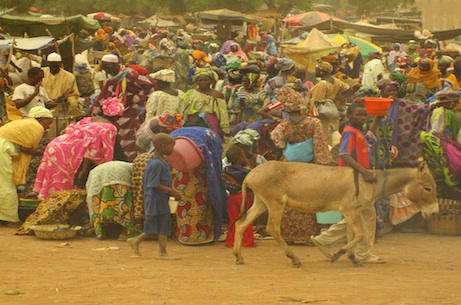
Nicole Basta writes about how political instability complicates medical research.
Bacterial meningitis can kill a perfectly healthy person in less than 48 hours. The disease is particularly feared in the African meningitis belt, which stretches across central Africa from Senegal to Ethiopia. Over the past century, hundreds of thousands of people have suffered from meningitis in the region.
Vaccination is the single most powerful way to prevent a directly transmitted infectious disease like bacterial meningitis. For three decades, public- health responders have waited to deploy vaccines in Africa until after an outbreak has been identified. While this strategy saves lives, it doesn’t prevent annual outbreaks because older vaccines provide only a few years of protection.
In 2010, a new era in the fight against meningitis in Africa began. The Meningitis Vaccine Project launched a preventative vaccination campaign with a newly developed vaccine, MenAfriVac, designed to protect long-term against a common cause of bacterial meningitis in Africa. To date, over 100 million people have been vaccinated.
I booked a trip to Bamako, Mali, in the months before the vaccine launch to conduct epidemiological research with the Centre for Vaccine Development-Mali (CVD-Mali). I had never been to Africa, but as an epidemiology PhD student, I was well aware of the challenges of conducting public-health research in low-resource settings. Classic cases that I had studied described how to communicate research objectives to participants, address ethical concerns and collect biological specimens despite constraints.
Once I arrived in Bamako, however, I quickly realised that, although I had spent months carefully designing a clinical research study, the logistical hurdles of implementing my plan in collaboration with 16 local staff members from CVD-Mali seemed insurmountable. How would we recruit a representative, population-based sample without a listing of residents? How would we convince participants that blood collection was safe, when many believed that blood never regenerated? How would we transport samples and prevent contamination when dry-season temperatures exceeded 40°C and thick yellow dust hung in the air?
Dr Samba Sow, the director of CVD-Mali, listened patiently to my concerns and responded with reassuring confidence. ‘This is what we do. These are our people, in our country. We conduct research to improve public health because it is what we believe in, so we will make it work.’
I began to ask more questions of my new colleagues and found that all were willing to help me understand how to make progress in an unfamiliar culture. Throughout the next two years of fieldwork, Dr Sow’s words rang true. None of my training had prepared me to take advantage of the greatest resource I encountered in Bamako: the doctors, nurses, technicians, social workers, community liaisons and others without whose knowledge, dedication and patience we would not have been able to proceed. By the time I graduated with my PhD, the CVD-Mali teams and I had begun to see research through each other’s eyes.
War
The course of history in Mali changed dramatically on 22 March 2012 when a military coup d’état overthrew the president, ending two decades of democratic rule and plunging the country into chaos. The destabilisation created an opportunity for Tuareg groups who had fought for independent rule in northern Mali to join forces with Islamists and occupy many of the key cities of Timbuktu, Gao and Kidal. The Islamists quickly drove out the Tuaregs and ushered in harsh Sharia law, claiming control over more than half the country. The French military intervention in early 2013 has so far succeeded in regaining control of cities in northern Mali, but the long, difficult road to restore peace, security and democratic rule has just begun.
The political instability facing Mali has taken the challenges of conducting public-health research to an entirely new and unexpected level. Given the warnings against travel to the region, I have not been able to visit CVD-Mali for months. Many well-meaning colleagues have advised me to abandon plans to continue research there and establish collaborations elsewhere.
But I am reminded of the lessons I learned during my early days of research in Bamako. By combining the unmatched skill of the CVD-Mali staff in implementing complex research protocols in resource-limited settings with my expertise in infectious-disease epidemiology, we have built a solid foundation. This synergy has ultimately safeguarded our research against many unforeseen challenges.
Recently, I received a five-year Early Independence Award from the National Institutes of Health to investigate the persistence of immunity following the introduction of MenAfriVac in Bamako. Amazingly, despite the chaos, uncertainty and fear gripping much of the country, CVD-Mali recently completed enrolling 800 participants for this research.
Public-health research can produce powerful evidence that will drive policy and ultimately reduce suffering. But behind the research lies the people without whom such knowledge could not be obtained. In order to endure, cross-cultural research collaboration must focus on building partnerships that can adapt and evolve to face the immense challenges which political turmoil and civil unrest cause.
*Nicole Basta [2004] did an MPhil in Epidemiology. This article appears in the current edition of The Gates Scholar. Picture of Djenne market by Nicole Basta.












